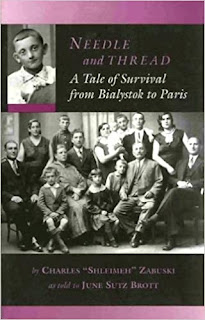Needle and Thread
I nabbed this memoir from the donation table a couple of years ago. I nearly always grab any Holocaust memoir I come across, but this one was particularly attractive because I like sewing, and because the author is from Bialystok, which I had read very little about, but remembered because Vasily Grossman's mother had lived there.
June Brott wrote down this story through many interviews with her cousin Charles, originally Shleimeh. They didn't really have a language in common, so it was quite difficult and was a process that took some years. Charles had never spoken about his experiences and did not want to, but because he was the only member of his family to survive, he decided that it was important that their stories be heard.
Shleimeh tells his whole life story; the oldest of 4 children, son of a tailor who had planned to emigrate to Argentina but had been coaxed back to Poland by his fiancee, he had greatly desired a good education, but the high school was so viciously anti-Semitic that his parents didn't allow it. So Shleimeh became a tailor too. When the Communists seized power, he learned to navigate that new world (and soon concluded that a Jew hoping for better from Communism would be very disappointed). He married quite young, and the Nazis invaded Bialystok just as his wife Henia was about to give birth to their first child.
Shleimeh and his whole family were interned in the Bialystok ghetto, and survived there for a couple of years. He chronicles the many jobs he did, anything to get some food for the nineteen people in the apartment. They managed to hold out until the ghetto was emptied, and everyone was sent to the camps. After that, the narrative is sprinkled with "I never saw ___ again." Shleimeh, as a young and strong man, teamed up with a cousin and together they protected his father, but they were moved several times to different work camps and eventually Shleimeh was alone. He survived through a mix of determination and luck.
Shleimeh really tells an amazing story, and this is a memoir that is well worth reading -- gripping and full of detail. The front cover is a family photo from 1929, with a zillion relatives who all look similar. Shleimeh is a little boy at the top, behind his parents, and his uncle Benny (June's father, who was shipped off to America as a youth because his trouble-making ways were too dangerous for Poland) on the far right. Everyone else died in the camps.





Comments
Post a Comment
I'd love to know what you think, so please comment!